 W
WAge of the Five is a trilogy of fantasy novels by Australian author Trudi Canavan; it consists of the novels: Priestess of the White, Last of the Wilds and Voice of the Gods. The fictional series recounts the story of Auraya, a young priestess who, after rising to the highest rank in her world's religious hierarchy, subsequently discovers that the gods she worships are significantly different entities from those in whom she was originally taught to believe.
 W
WBaptism is a 2012 crime novel by British author Max Kinnings. A movie based on the book has also been commissioned.
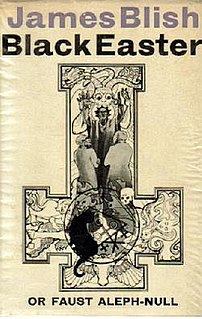 W
WBlack Easter is a fantasy novel by American writer James Blish, in which an arms dealer hires a black magician to unleash all the demons of Hell on Earth for a single day. It was first published in 1968. The sequel is The Day After Judgment. Together, those two novellas form the third part of the thematic After Such Knowledge trilogy with A Case of Conscience and Doctor Mirabilis. Blish has stated that it was only after completing Black Easter that he realized that the works formed a trilogy.
 W
WBlasphemy is a novel by Douglas Preston that was released on January 8, 2008 by Forge Books. It is the second book in the Wyman Ford series, exploring philosophical and theological ideas.
 W
WThe Book of Lights is a 1981 novel by Chaim Potok about a young rabbi and student of Kabbalah whose service as a United States military chaplain in Korea and Japan after the Korean War challenges his thinking about the meaning of faith in a world of "light" from many sources.
 W
WThe Book of the New Sun (1980–1983) is a four volume, science fantasy novel written by the American author Gene Wolfe. It inaugurated the "Solar Cycle" that Wolfe continued by setting other works in the same universe.
 W
WThe Brunist Day of Wrath is Robert Coover's tenth novel. It is a sequel to The Origin of the Brunists, which told the story of Giovanni Bruno, the lone survivor of a mine disaster that killed 97 of his co-workers, and the first several months of the apocalyptic cult that formed around him, ending in their disastrous scattering. The Brunist Day of Wrath is set five years later, as the cult returns to West Condon.
 W
WThe Cat Who Went to Heaven is a 1930 novel by Elizabeth Coatsworth that won the Newbery Medal for excellence in American children's literature in 1931. The story is set in ancient Japan, and is about a penniless artist and a calico cat his housekeeper brings home.
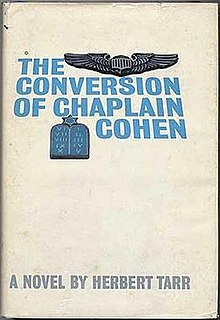 W
WThe Conversion of Chaplain Cohen is a 1963 novel by the American writer and rabbi Herbert Tarr about a young rabbi serving as a United States Air Force military chaplain.
 W
WThe Crow Road is a novel by the Scottish writer Iain Banks, published in 1992.
 W
WThe Devil All the Time is the debut novel by American writer Donald Ray Pollock, published in 2011 by Doubleday. Its plot follows disparate characters in post-World War II Southern Ohio and West Virginia, including a disturbed war veteran, a husband and wife who are serial killers, and a false preacher. A film adaptation of the same name directed by Antonio Campos starred Tom Holland, Sebastian Stan, Robert Pattinson and Bill Skarsgård, and was produced by Jake Gyllenhaal.
 W
WThe Divine Invasion is 1981 science fantasy novel by American writer Philip K. Dick. It is the second book in the gnostic VALIS trilogy, and takes place in the indeterminate future, perhaps a century or more after VALIS. The novel, originally titled Valis Regained, was nominated to the BSFA Award.
 W
WDune is a 1965 science fiction novel by American author Frank Herbert, originally published as two separate serials in Analog magazine. It tied with Roger Zelazny's This Immortal for the Hugo Award in 1966 and it won the inaugural Nebula Award for Best Novel. It is the first installment of the Dune saga; in 2003, it was described as the world's best-selling science fiction novel.
 W
WEarth Made of Glass (1998) is a science fiction novel by American writer John Barnes, the second book of his Thousand Cultures series. The story is told from the perspective of a middle-aged special agent named Giraut. Earth Made of Glass examines religious extremism when two different cultures are forced into proximity.
 W
WThe Fall of the Imam is a novel by Egyptian writer Nawal El Saadawi published in Arabic in 1987. The English translation by the author's husband Sherif Hetata was published in 1988.
 W
WThe Fire Gospel is a 2008 novel by Michel Faber published by Canongate Books in its Myth Series.
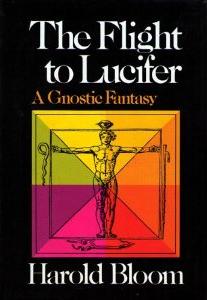 W
WThe Flight to Lucifer: A Gnostic Fantasy is a 1979 fantasy novel by American critic Harold Bloom, inspired by his reading of David Lindsay's fantasy novel A Voyage to Arcturus (1920). The plot, which adapts Lindsay's characters and narrative and features themes drawn from Gnosticism, concerns Thomas Perscors, who is transported from Earth to the planet Lucifer by Seth Valentinus.
 W
WThe Gates Ajar is an 1868 religious novel by Elizabeth Stuart Phelps that was immensely popular following its publication. It was the second best-selling religious novel of the 19th century. 80,000 copies were sold in America by 1900; 100,000 were sold in England during the same time period. Sequels Beyond the Gates (1883) and The Gates Between (1887) were also bestsellers, and the three together are referred to as the author's "Spiritualist novels."
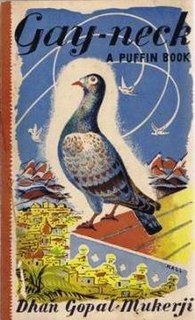 W
WGay-Neck, the Story of a Pigeon is a 1928 children's novel by Dhan Gopal Mukerji that won the Newbery Medal for excellence in American children's literature in 1928. It deals with the life of Gay-Neck, a prized Indian pigeon. Mukerji wrote that "the message implicit in the book is that man and winged animals are brothers." He stated that much of the book is based on his boyhood experiences with a flock of forty pigeons and their leader, as the boy in the book is Mukerji himself. He did have to draw from the experiences of others for some parts of the book, such as those who trained messenger pigeons in the war. The book offers an insight into the life of a boy of high caste during the early 1900s and also into the training of pigeons. Several chapters are told from Gay-Neck's perspective, with the pigeon speaking in first person. Elizabeth Seeger writes in a biographical note about Mukerji that, "Gay-Neck was written in Brittany, where every afternoon he read to the children gathered about him on the beach the chapter he had written in the morning." In an article in the children's literature journal The Lion and the Unicorn, Meena G. Khorana calls the novel one of the few children's novels from Western or Indian authors to explore the Himalayas in a meaningful way, and notes the way Mukerji recalls their "grandeur and spiritual power".
 W
WGods with a Little G is a 2019 novel written by Tupelo Hassman about a teenage girl's coming-of-age in a religious town.
 W
WThe Heroic Legend of Arslan is a Japanese fantasy novel series written by Yoshiki Tanaka. It was published from 1986 to 2017, with sixteen novels and one side-story in the official guidebook Arslan Senki Dokuhon. Set in ancient Persia, it is loosely based on the Persian epic of Amir Arsalan.
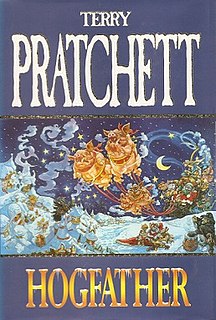 W
WHogfather is the 20th Discworld novel by Terry Pratchett, and a 1997 British Fantasy Award nominee. It was first released in 1996 and published by Victor Gollancz. It came in 137th place in The Big Read, a BBC survey of the most loved British books of all time, making it one of fifteen books by Pratchett in the Top 200.
 W
WInferno is a fantasy novel written by Larry Niven and Jerry Pournelle, published in 1976. It was nominated for the 1976 Hugo and Nebula Awards for Best Novel.
 W
WLord of Light (1967) is a science fantasy novel by American author Roger Zelazny. It was awarded the 1968 Hugo Award for Best Novel, and nominated for a Nebula Award in the same category. Two chapters from the novel were published as novelettes in the Magazine of Fantasy and Science Fiction – "Dawn" in April 1967, and "Death and the Executioner" in June 1967.
 W
WThe Man Who Was Thursday: A Nightmare is a 1908 novel by G. K. Chesterton. The book has been described as a metaphysical thriller.
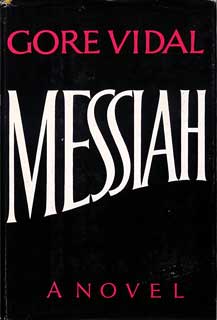 W
WMessiah is a satirical novel by Gore Vidal, first published in 1954 in the United States by E.P. Dutton. It is the story of the creation of a new religion, Cavism, which quickly comes to replace the established but failing Christian religion.
 W
WThe Name of the Rose is the 1980 debut novel by Italian author Umberto Eco. It is a historical murder mystery set in an Italian monastery in the year 1327, and an intellectual mystery combining semiotics in fiction, biblical analysis, medieval studies, and literary theory. It was translated into English by William Weaver in 1983.
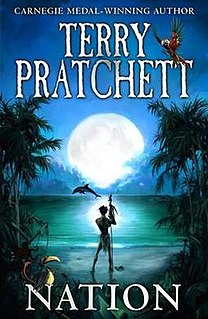 W
WNation is a novel by Terry Pratchett, published in the UK on 11 September 2008 and in the US on 6 October 2009. It was the first non-Discworld Pratchett novel since Johnny and the Bomb (1996). Nation is a low fantasy set in an alternative history of our world in the 1860s. The book received recognition as a Michael L. Printz Honor Book for 2009.
 W
WNorthern Lights is a young-adult fantasy novel by Philip Pullman, published in 1995 by Scholastic UK. Set in a parallel universe, it follows the journey of Lyra Belacqua to the Arctic in search of her missing friend, Roger Parslow, and her imprisoned uncle, Lord Asriel, who has been conducting experiments with a mysterious substance known as "Dust".
 W
WThe Origin of the Brunists is Robert Coover's first novel. It tells the story of Giovanni Bruno, the lone survivor of a mine disaster that killed 97 of his co-workers, and the apocalyptic cult that forms around him.
 W
WPaladin of Souls is a 2003 fantasy novel by American writer Lois McMaster Bujold. It won the "triple crown" of Hugo, Locus, and Nebula awards. It is a sequel to The Curse of Chalion, and takes place approximately three years later. The series that it is part of, World of the Five Gods, won the Hugo Award for Best Series in 2018.
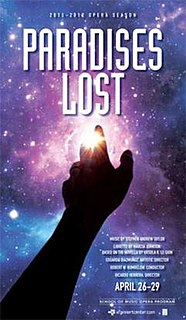 W
WParadises Lost is a science fiction novella by American author Ursula K. Le Guin. It was first published in 2002 as a part of the collection The Birthday of the World. It is set during a multigenerational voyage from Earth to a potentially habitable planet. The protagonists, Liu Hsing and Nova Luis, are members of the fifth generation born on the ship. The story follows them as they deal with members of religious cult who do not believe in the ship stopping at its intended destination. They also face a crisis brought on by a drastic change in the ship's schedule. The novella has since been anthologized as well as adapted into an opera of the same name.
 W
WThe Pilgrim's Progress from This World, to That Which Is to Come is a 1678 Christian allegory written by John Bunyan. It is regarded as one of the most significant works of religious, theological fiction in English literature. It has been translated into more than 200 languages, and has never been out of print. It appeared in Dutch in 1681, in German in 1703 and in Swedish in 1727. The first North American edition was issued in 1681. It has also been cited as the first novel written in English.
 W
WThe Plumed Serpent is a 1926 political novel by D. H. Lawrence; Lawrence conceived the idea for the novel while visiting Mexico in 1923, and its themes reflect his experiences there. The novel was first published by Martin Secker's firm in the United Kingdom and Alfred A. Knopf in the United States; an early draft was published as Quetzalcoatl by Black Swan Books in 1995. The novel's plot concerns Kate Leslie, an Irish tourist who visits Mexico after the Mexican Revolution. She encounters Don Cipriano, a Mexican general who supports a religious movement, the Men of Quetzalcoatl, founded by his friend Don Ramón Carrasco. Within this movement, Cipriano is identified with Huitzilopochtli and Ramón with Quetzalcoatl. Kate eventually agrees to marry Cipriano, while the Men of Quetzalcoatl, with the help of a new President, bring about an end to Christianity in Mexico, replacing it with Quetzalcoatl worship.
 W
WThe Rapture of Canaan is a 1995 novel by Sheri Reynolds. The book was chosen as an Oprah's Book Club selection in 1997, and the paperback edition subsequently made the Publishers Weekly and New York Times bestseller lists.
 W
WThe Shroud Conspiracy, a thriller novel authored by John Heubusch, focuses on the race between science and religion to exploit Christianity’s most famous relic, the Shroud of Turin. When science and faith collide, accidents can happen and the result is unleashed on the planet with the promise of devastating consequences. The book was published on March 14, 2017. The sequel to The Shroud Conspiracy, The Second Coming, was scheduled for publication in 2018.
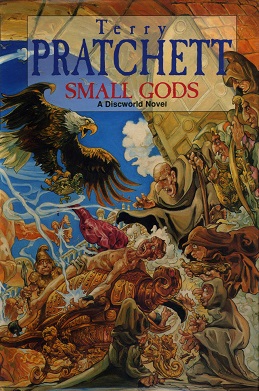 W
WSmall Gods is the thirteenth of Terry Pratchett's Discworld novels, published in 1992. It tells the origin of the god Om, and his relations with his prophet, the reformer Brutha. In the process, it satirises religious institutions, people, and practices, and the role of religion in political life.
 W
WA Song of Ice and Fire is a series of epic fantasy novels by the American novelist and screenwriter George R. R. Martin. He began the first volume of the series, A Game of Thrones, in 1991; the book was published in 1996. Martin, who initially envisioned the series as a trilogy, has published five out of a planned seven volumes. The fifth and most recent volume of the series, A Dance with Dragons, was published in 2011 and took Martin six years to write. He is currently writing the sixth novel, The Winds of Winter. A seventh novel, A Dream of Spring, is planned.
 W
WThe Stand is a post-apocalyptic dark fantasy novel written by American author Stephen King and first published in 1978 by Doubleday. The plot centers on a deadly pandemic of weaponized influenza and its aftermath, in which the few surviving humans gather into factions that are each led by a personification of either good or evil and seem fated to clash with each other. King started writing the story in February 1975, seeking to create an epic in the spirit of The Lord of the Rings that was set in contemporary America. The book was difficult for him to write because of the large number of characters and storylines.
 W
WTerra Ignota is a quartet of science fiction novels by the American author Ada Palmer. The series consists of Too Like the Lightning (2016), Seven Surrenders (2017), The Will to Battle (2017), and Perhaps the Stars (2021). Set in the year 2454, they follow the events that lead the world to war for the first time after three centuries of peace following the end of the nation state. The novels have won several awards and the first was a finalist for the 2017 Hugo Award for Best Novel.
 W
WTime and Again is a 1951 science fiction novel by American writer Clifford D. Simak. An alternate paperback title was First He Died; it was also serialized as Time Quarry.
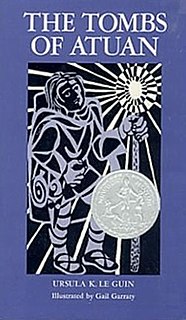 W
WThe Tombs of Atuan is a fantasy novel by the American author Ursula K. Le Guin, first published in the Winter 1970 issue of Worlds of Fantasy, and published as a book by Atheneum Books in 1971. It is the second book in the Earthsea series after A Wizard of Earthsea (1969). The Tombs of Atuan was a Newbery Honor Book in 1972.
 W
WThe Transmigration of Timothy Archer is a 1982 novel by American writer Philip K. Dick. As his final work, the book was published shortly after his death in March 1982, although it was written the previous year.
 W
WTrinity Blood is a series of Japanese light novels written by Sunao Yoshida with illustrations by Thores Shibamoto and originally serialized in The Sneaker. Set 900 years after an apocalyptic war between humans and vampires, the series focuses on the ongoing cold war between the Vatican, the human government, and the "New Human Empire", the government of the vampiric Methuselah. Fighting on the Vatican's side is Abel Nightroad, a Crusnik - a vampire that feeds on vampires. The novels blend science fiction, fantasy, and political intrigue, with some in the Vatican and the Empire striving for peace, and the Rosen Kreuz Order doing anything in its power to stop it.
 W
WValediction is the 11th book in Robert B. Parker's Spenser series and first published in 1984.
 W
WThe Wanderers is a novel by Ingrid Rimland published in 1977 loosely based upon her own experiences from growing up in a Mennonite community in the Ukraine. Rimland wanted to write a novel about her people, and The Wanderers tells the story of the plight of Mennonite women caught in the social upheavals of revolution and war. The novel traces the decimation of a pacifist people during the Russian Revolution, anarchy, famine, the Stalinist purges, escape from the Ukraine, and eventual resettlement in the rain forests of Paraguay.
 W
WWhit, or, Isis amongst the unsaved is a novel by the Scottish writer Iain Banks, published in 1995. Isis Whit, a young but important member of a small, quirky cult in Scotland, narrates. The community suspects that Isis' cousin Morag is in danger, and sends Isis out to help.